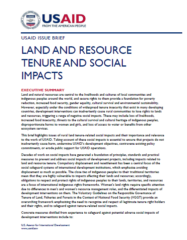
Land and natural resources are central to the livelihoods and cultures of local communities and indigenous peoples around the world, and secure rights to them provide a foundation for poverty reduction, increased food security, gender equality, cultural survival and environmental sustainability. However, especially under the conditions of widespread tenure insecurity that exist in many developing countries, development interventions can inadvertently cause rural communities to lose rights to lands and resources, triggering a range of negative social impacts. These may include loss of livelihoods, increased food insecurity, threats to the cultural survival and cultural heritage of indigenous peoples, disproportionate harms to women and girls, and loss of access to water or benefits from other ecosystem services.
This brief highlights issues of rural land tenure-related social impacts and their importance and relevance to the work of USAID.
